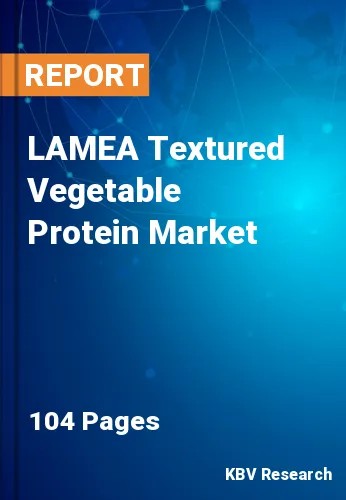The Latin America, Middle East and Africa Textured Vegetable Protein Market would witness market growth of 9.4% CAGR during the forecast period (2022-2028).
It appears that soy products can be consumed in moderation and are even healthy for the majority of individuals, according to health experts. One serving of textured vegetable protein has 9 grams of total carbohydrates, making it a dietary staple. The carbohydrates contribute to the health of the brain, muscles, and kidneys in addition to helping the body produce energy. Additionally, the amount of fiber present in textured vegetable protein aid in digestion and help control blood sugar levels.
The defatted thermoplastic proteins are heated to 150-200 °C (300-390 °F), where they denature into a fibrous, insoluble, porous network capable of absorbing up to three times their weight in liquids. The sudden drop in pressure as the high pressure molten protein mixture exits the extruder causes rapid expansion into a puffy solid, which is then dried Many textured vegetable protein manufacturers use hexane to split soy fat from soy protein, as well as trace amounts of the solvent remain after the process.
Consistent meat eaters are more susceptible to developing chronic diseases like diabetes, atherosclerosis, and obesity. The demand for meat alternatives in the UAE is expanding due to rising health concerns about meat eating and a number of recent animal diseases. A rise in the popularity of clean eating among consumers and improved knowledge of the nutritional value of foods are driving up the desire for plant-based meat alternatives. Increased demand for ambient, chilled, & frozen segments and the introduction of flavorful, novel meat substitute goods.
The Brazil market dominated the LAMEA Textured Vegetable Protein Market by Country in 2021, and would continue to be a dominant market till 2028; thereby, achieving a market value of $35.9 million by 2028. The Argentina market is experiencing a CAGR of 10% during (2022 - 2028). Additionally, The UAE market would display a CAGR of 9.1% during (2022 - 2028).
Based on Application, the market is segmented into Meat Alternatives, Cereals & Snacks, and Other Applications. Based on Type, the market is segmented into Slices, Flakes, Granules, and Chunks. Based on Source, the market is segmented into Soy, Wheat, and Pea. Based on Form, the market is segmented into Dry and Wet. Based on Nature, the market is segmented into Conventional and Organic. Based on countries, the market is segmented into Brazil, Argentina, UAE, Saudi Arabia, South Africa, Nigeria, and Rest of LAMEA.
Free Valuable Insights: The Global Textured Vegetable Protein Market is Predict to reach $2 Billion by 2028, at a CAGR of 6.5%
The market research report covers the analysis of key stake holders of the market. Key companies profiled in the report include Cargill Corporation, Archer Daniels Midland Company, Kansas Protein Foods, Ingredion, Incorporated, Koninklijke DSM N.V., Roquette Frères SA, The Scoular Company, Foodchem International Corporation, BENEO GmbH (Südzucker AG), and Axiom Foods, Inc.
By Application
By Type
By Source
By Form
By Nature
By Country
Our team of dedicated experts can provide you with attractive expansion opportunities for your business.

